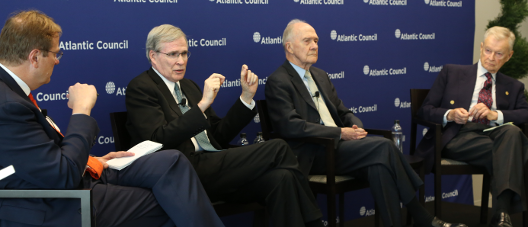 The Atlantic Council’s 2013 Members Conference concluded with a star-studded panel, “US Strategy in a World in Transition,” featuring former National Security Advisers Brent Scowcroft, Stephen Hadley, and Zbigniew Brzezinski, moderated by Atlantic Council President & CEO Frederick Kempe.
The Atlantic Council’s 2013 Members Conference concluded with a star-studded panel, “US Strategy in a World in Transition,” featuring former National Security Advisers Brent Scowcroft, Stephen Hadley, and Zbigniew Brzezinski, moderated by Atlantic Council President & CEO Frederick Kempe.
US Strategy in a World in Transition by Atlantic Council US Strategy in a World in Transition by Atlantic Council
Related ContentThe Members’ Conferences was followed immediately by an Open House. |
Kempe kicked off the panel by asking each of the three former national security advisers to offer some strategic advice to President Obama.
Brzezinski, national security adviser to President Jimmy Carter, urged President Obama to focus his attention on the upheaval in the Middle East, calling a peace agreement in Syria the “linchpin” of regional stability. A stable Syria would remove a major roadblock for US-led nuclear negotiations with Iran, in addition to cooling temperatures enough to allow for progress on an Israeli-Palestinian agreement.
General Scowcroft, who served as national security adviser to Presidents Gerald Ford and George H.W. Bush, explained that during the Cold War, the United States crafted policy around broad, straightforward goals. In an increasingly complex and crowded world, however, US foreign policy lacks the strategic focus necessary to tackle future challenges and promote global stability.
Hadley, national security advisor of the second Bush administration, called for strategic cooperation between the United States and China on the century’s coming challenges – especially balancing growing demand for energy with concerns about resource scarcity and climate change. He criticized the lack of US leadership in ousting the Assad regime in Syria, noting that democratic opposition forces in the war-torn country are fighting a two-front war against the regime and extremist factions within their own ranks. He cautioned President Obama not to lose sight of the important goal of dealing with the threat posed by Al Qaeda and other terrorist groups.
The panel discussed a range of foreign policy challenges, including the possibility of a new great power relationship between the United States and China, rising tensions in Asia over territorial disputes between Japan and China, and the upcoming negotiations over the Transatlantic Trade and Investment Partnership.
